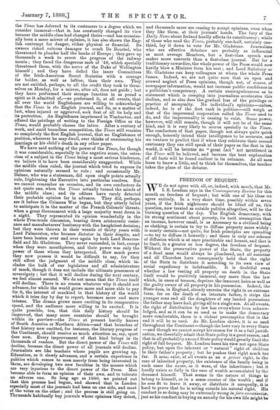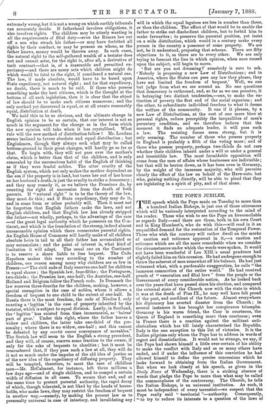FREEDOM OF BEQUEST.
WE do not agree with all, or, indeed, with much, that Mr. I. S. Leadam says in the Contenzporary Review for this month on freedom of bequest ; but with one of his ideas we agree entirely. In a very short time, possibly within seven years, if the Irish nightmare should be lifted off us, this question, now treated as outside politics altogether, will be the burning question of the day. The English democracy, with its strong sentiment about poverty, its tacit assumption that an income, however small, is as necessary to a civilised being as clothing, is certain to try to diffuse property more widely ; is nearly certain—not quite, for Irish principles are spreading —to try to diffuse it honestly ; and there is only one scheme of diffusion which is at once practicable and honest, and that is to limit, in a greater or less degree, the freedom of bequest. Without the preservative power of the State, the property of a dead man would always be plundered, and all societies and all Churches have consequently held that the right of the State to distribute it according to its own view of social expediency is indefeasible. It is doubtful even whether a law vesting all property on death in the State itself would be positively immoral, any more than the law which, in cases of treason, deprives the innocent heirs as well as the guilty owner of all property in his possession. Indeed, the State does, in England, already exercise the right in an extreme form, for on the death of an intestate father, it strips the younger sons and all the daughters of any landed possessions the father may have had, giving all to a single son. At all events, the right of distribution by law has everywhere been acknow- ledged, and as it can be so used as to make the democracy more comfortable, there is a violent presumption that in the end it will be so used. As Mr. Leadam shows, it is so used throughout the Continent—though the laws vary in every State —and though we cannot accept his reason for it as a full justifi- cation, we cheerfully admit that State policy is a good reason, and that in all probability a sound State policy would greatly limit the right of full bequest. Mr. Leadam bases his view not upon State policy, but upon the inherent or "natural" right of children to their father's property ; but he pushes that right much too far. It mite'. exist, at all events as an a priori right, in the case of inherited property, the existence of the family being in such cases the cause, as it were, of the inheritance ; but it hardly exists so fully in the case of wealth accumulated by the deceased himself. That seems in the nature of things to belong to himself, as in a sense creator of the wealth ; and if he sees fit to leave it away, or distribute it unequally, it is hard to prove that he is acting outside his natural right. His conduct in so doing may be extremely wrong in for° conscizntia, just as his conduct in buying an annuity for his own life might be extremely wrong, but it is not a wrong on which earthly tribunals can accurately decide. If fatherhood involves obligations, it also involves rights. The children may be utterly wanting in all the requirements of filial duty—even the Roman law cut off a son who struck his father—or may have forfeited all rights by their conduct, or may be persons on whom, as the father knows, money would be thrown away. In such cases, the natural right to the self-gathered wealth of a testator does not and cannot arise, for the right is, after all, a derivative of tacit contract—that is, of a reasonable and permitted ex- pectancy—and there are many acts which children might do which would be fatal to the right, if considered a natural one. The law, if made absolute, would have to be based upon State expediency, not natural right ; and for that expediency, no doubt, there is much to be said. If those who possess something make the best citizens, which is the thought at the bottom of all such legislation, then it is clear that the object of law should be to make such citizens numerous ; and the only method yet discovered is equal, or at all events reasonably equal, distribution at death.
We hold this to be so obvious, and the ultimate change in English opinion to be so certain, that our interest is not so much in the argument for the change as in the form which the new opinion will take when it has crystallised. What rule will the new method of distribution follow ? Mr. Leadam seems inclined to favour absolute and equal distribution ; but Englishmen, though they always seek what may be called bottom-ground in their great changes, will hardly go so far as that. To begin with, they will not pass over the mother's -claim, which is better than that of the children, and is only -concealed by the unconscious habit of the English of thinking as if they were feudal nobles. The utter cruelty of the English system, which not only makes the mother dependent on the son if the property is in land, but turns her out of her home on her husband's death, is just the cruelty to strike a democracy ; and they may remedy it, as we believe the Prussians do, by counting the right of succession from the death of both parents. If "natural right" is to be the theory of the law, they must do this ; and if State expediency, they may do it, and in some form or other probably will. Then it must not he forgotten that English fathers make the laws, and not English children, and that English law has already stripped the father—not wholly, perhaps, to the advantage of the race —of the great legal authority which he possesses on the Con- tinent, and which is the foundation of the strong, indeed almost unreasonable opinion which there consecrates parental rights. An English House of Commons will hardly make of all children absolute heirs in tail to all their father has accumulated or may accumulate ; and the point of interest is, what kind of limitation it will adopt. The usual one on the Continent is to reserve a share liable to free bequest. The Code Napoleon makes this vary according to the number of children, one reason among many why children are so few in France The civil code of Italy reserves one-half for children in equal shares ; the Spanish law, four-fifths ; the Portuguese, two-thirds ; the Prussian law, one-half; the Austrian, one-half. Holland and Belgium follow the French code. In Denmark the law reserves three-fourths for the children, making, however, a special exemption in the case of nobles, whom it allows a freedom of bequest to one child to the extent of one-half. In Russia there is the most freedom, the code of Nicolas I. only exacting a legitim ' in the case of property inherited by the testator, which is subject to equal division. Lastly, in Scotland, the ' legitim ' has existed from time immemorial, as bairns' part of gear.' Under this right, where the father leaves a widow and children, the latter take one-third of the per- sonalty ; where there is no widow, one-half ; and this cannot be defeated by any mortis causa conveyance of movables." The Scotch law will seem to the English a strong precedent, and they will, of course, reserve some fraction to the owner, if only for the sake of bequests to charities ; but it must be remembered that, if they pass such a law at all, they will do it not so much under the impulse of the old idea of justice as of the new idea of the expediency of diffusing property. They will be tempted, therefore, to meet the case of childless men—Mr. McCalmont, for instance, left three millions a few days ago—and of single children, and to compel a certain width of diffusion in all cases. To secure that end, and at the same time to protect parental authority, the rapid decay of which, though tolerated, is not liked by the heads of house- holds, who make laws, they may restrict the freedom of bequest in another way,—namely, by making the present law as to personalty universal in case of intestacy, and invalidating any, will in which the equal legatees are less in number than three, or than the children. The effect of that would be to enable the father to strike out disobedient children, but to forbid him to make favourites ; to preserve the parental position, yet insist on a wide distribution, which would in a century make every person in the country a possessor of some property. We are not, be it understood, proposing that scheme. There are fifty objections to it, as there are to every other. We are only trying to forecast the line in which opinion, when once roused upon the subject, will begin to move.
'But are you not dreaming?' somebody is sure to ask. 'Nobody is proposing a new Law of Distributions ; and in America, where the States can pass any law they please, they have not limited the freedom of bequest.' Well, we can but judge from what we see around us. No one questions that democracy is enthroned, and, so far as we can perceive, it is betraying two distinct tendencies,—one, to make the ex- tinction of poverty the first end of the social organism ; and the other, to subordinate individual freedom to what it deems the welfare of the community. It can if it pleases, by a new Law of Distributions, at the cost of one more blow at personal rights, reduce perceptibly the inequalities of men's pecuniary condition, and we therefore believe that the moment it finds an adequate leader, it will pass such a law. The resisting forces seem strong, but it is only seeming. The number of those who possess property in England is probably a fifth of the voting mass ; and of those who possess property, perhaps two-thirds do not care whether their children inherit under a will or under a general and irresistible law, The most formidable opposition will come from the men of affairs whose businesses are indivisible ; but that will be beaten down, as it has been even in Germany, by the weight of the immense majority, who will perceive clearly the effect of the law on behalf of the Have-note, but who, gaining nothing directly, will be able to plead that they are legislating in a spirit of pity, and of that alone.























































 Previous page
Previous page